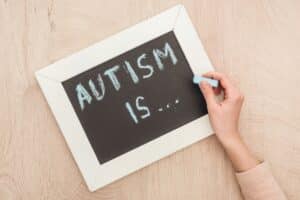Social Anxiety vs. Autism
- Updated:

In the nuanced world of mental health care, differentiating between social anxiety and autism is not just an academic exercise—it’s a critical step toward ensuring individuals receive the most appropriate support and intervention. While distinct in their roots and manifestations, both conditions present significant challenges in social situations. A deep-seated fear of social interactions characterizes social anxiety disorder (SAD) due to apprehension about being judged or embarrassed. This anxiety can severely limit individuals’ ability to engage in social, academic, or professional activities.
Autism Spectrum Disorder (ASD), a developmental condition affecting around 1 in 54 children according to the Centers for Disease Control and Prevention (CDC), presents a different set of challenges. Individuals with autism may struggle with social communication and interaction not because of fear of judgment but due to intrinsic differences in understanding social cues and norms. This can make navigating social environments particularly challenging. Despite these differences, there’s a significant overlap in how these conditions can affect someone’s life—primarily in their ability to form and maintain social connections. Importantly, research suggests a high co-occurrence rate of social anxiety among individuals with autism, with anxiety disorders being among the most common co-occurring conditions.
Acknowledging these complexities, Acera Health is committed to providing nuanced care that addresses the specific needs of those with social anxiety, autism, or both. Through comprehensive assessments and personalized treatment plans, we strive to untangle the intertwined symptoms of these conditions, offering a path towards improved communication, reduced anxiety, and a better quality of life. By fostering a supportive and understanding environment, Acera Health aims to empower individuals to navigate their social worlds more confidently and comfortably.
The Essence of Social Anxiety and Autism
Navigating the realms of Social Anxiety Disorder (SAD) and Autism Spectrum Disorder (ASD) requires a deep understanding of their core characteristics and how they manifest in individuals’ lives. Social Anxiety Disorder, a condition that affects millions worldwide, triggers an overwhelming fear of being negatively judged or embarrassed in social situations. This fear is so intense that it can severely restrict participation in everyday social, academic, and professional activities. Individuals with SAD are often acutely aware of social expectations and norms but may choose to avoid social interactions entirely to sidestep potential embarrassment or rejection. This avoidance can lead to significant isolation and hinder personal and professional growth.
Autism Spectrum Disorder presents a different set of challenges, primarily affecting communication and behavior. With a range that spans from mild to severe, ASD encompasses a wide variety of symptoms, but expected to many affected individuals is difficulty in grasping social cues and norms. This challenge doesn’t stem from a fear of social judgment, as seen with SAD, but rather from a fundamental difference in understanding and processing social information. Consequently, people with autism might find it hard to engage in typical social interactions, which can lead to misinterpretations and strained relationships. Additionally, the sensory sensitivities common in autism can influence eating behaviors, leading to conditions like ARFID (Avoidant/Restrictive Food Intake Disorder). The co-occurrence of ARFID and autism underscores the need for a holistic approach to autism care, addressing a wide range of sensory and dietary preferences.
Despite these challenges, it’s essential to recognize the strengths and unique perspectives that individuals with autism bring to our communities, highlighting the diversity of human cognition and interaction. A unique aspect of ASD that differentiates it from social anxiety is ‘autism fixation,’ where individuals may show intense interest in specific topics or activities. This characteristic significantly shapes their social interactions and learning experiences, highlighting the spectrum’s depth.
Distinguishing Between Social Anxiety and Autism
Symptoms Overlap and Differences
Individuals grappling with social anxiety and autism may face challenges in social situations, yet the root of their struggles often diverges. Social anxiety disorder (SAD) is marked by a pronounced fear of being negatively judged or embarrassed in social settings. This condition engenders a heightened sensitivity to social expectations, leading to significant distress and often avoidance of social interactions. Research published in the Anxiety and Depression Association of America indicates that about 15 million American adults are affected by social anxiety, underscoring its prevalence and the critical need for understanding and intervention. On the opposite spectrum, autism, a developmental disorder identified in early childhood, presents difficulties in social interaction due to a fundamental misunderstanding of social cues and norms rather than fear of judgment.
This lack of intuitive grasp of social dynamics can result in behaviors or interactions that seem out of step with conventional expectations, not out of fear but from a distinct way of processing social information. While navigating the distinctions between social anxiety and autism, it’s equally pivotal to explore comparisons with other conditions, such as in the context of ‘BPD vs autism,’ where overlapping symptoms demand a nuanced approach to diagnosis and care.
Developmental Trajectories
Autism spectrum disorder (ASD) is inherently a developmental condition, usually evident before the age of three, impacting an individual’s ability to communicate and interact with others across the lifespan. Conversely, social anxiety can manifest at any stage of life, frequently emerging during adolescence. Its development is often tied to specific incidents or accumulated experiences that heighten sensitivity to social scrutiny. Unlike autism, which is present from early childhood and affects development broadly, social anxiety explicitly targets an individual’s interaction within social contexts, potentially evolving in response to life’s social challenges.
Treatment Approaches
Addressing the nuances between social anxiety and autism, Acera Health underlines the importance of customized treatment strategies for each. Cognitive-behavioral therapy (CBT) is a cornerstone in treating social anxiety, focusing on modifying detrimental thought patterns and behavior, thereby reducing avoidance of social situations. Systematic desensitization, a component of CBT, gradually exposes individuals to feared social scenarios to lessen their anxiety over time, proving effective for many. For autism, an integrative treatment approach is essential, encompassing behavioral therapy to enhance communication skills, speech therapy to improve verbal and nonverbal communication, and occupational therapy to support daily living skills. Techniques such as Applied Behavior Analysis (ABA) are pivotal in autism treatment, offering structured strategies to foster skill development and behavioral modification. Through these tailored interventions, individuals with either condition can achieve better social functioning and quality of life, highlighting the critical role of personalized care in managing diverse mental health challenges.
How Autistic Masking Contributes to Anxiety
Understanding the relationship between autistic masking and anxiety is crucial in differentiating social anxiety from autism, especially since these conditions can co-occur and complicate diagnoses. Autistic individuals often engage in masking, a process where they consciously or unconsciously adapt their behaviors to fit into social norms. This adaptation requires a heightened level of vigilance and can lead to significant mental exhaustion and anxiety over time.
- The Impact of Hypervigilance: Masking involves constantly monitoring one’s environment and adjusting behaviors, expressions, and speech patterns to avoid social scrutiny or judgment. This continuous state of alertness not only drains energy but also amplifies the fear of making mistakes or being misunderstood, common concerns in those with social anxiety.
- Judgment and Criticism: For those who mask their autism, social interactions can become a loop of perceived judgment, leading to continuous adjustments in their “social rulebook.” This sensitivity to criticism further aligns with the experiences of individuals with social anxiety, blurring the lines between the two conditions.
- Overlap and Co-occurrence: It’s essential to recognize that social anxiety is significantly more prevalent among individuals with autism than in the general population. This co-occurrence suggests a complex relationship where autistic masking can exacerbate or even mimic social anxiety symptoms. As such, both clinicians and caregivers should be aware of the nuances involved in assessing and supporting individuals with either or both conditions.
- Navigating Through Autistic Masking and Anxiety at Acera Health: At Acera Health, we prioritize a nuanced understanding of each individual’s experience. Our approach to treatment considers the unique ways in which autistic masking and social anxiety intersect, offering personalized strategies to manage stress and reduce the need for masking. Through a blend of therapeutic interventions, we aim to empower our clients to navigate social situations more comfortably and authentically.
By addressing the intersection of autistic masking and social anxiety, Acera Health remains committed to providing comprehensive care that acknowledges the complexity of mental health. Understanding these dynamics is critical to supporting individuals in achieving better mental well-being and improving their quality of life. Understanding ‘how autism affects the brain‘ offers valuable insights into the condition, revealing that autism is not just about social and communication differences but also involves unique neurological structures and functions. This perspective is essential for appreciating the complexity of autism and the diverse experiences of those on the spectrum.
Navigating Treatment at Acera Health
Personalized Care Plans: At Acera Health, understanding that each individual is unique is the cornerstone of our treatment philosophy. Our team of experts crafts customized care plans that address the specific needs of those with social anxiety, autism, or any other mental health condition.
- Supportive Environment: Our residential treatment center provides a supportive and nurturing environment that allows individuals to explore their challenges safely and develop the skills needed for a more fulfilling life. For individuals with autism, our programs focus on enhancing communication, social skills, and adaptability. For those dealing with social anxiety, we offer strategies to manage anxiety symptoms and improve social engagement.
- Integrative Therapies: Recognizing the complexity of mental health, Acera Health incorporates a variety of therapeutic modalities, including cognitive-behavioral therapy (CBT), dialectical behavior therapy (DBT), art therapy, and mindfulness practices. This integrative approach ensures that our residents receive comprehensive care tailored to their unique situations.
Acera Health: Your Partner in Understanding and Treatment
Deciphering the nuances between social anxiety and autism is crucial for accessing appropriate care and support. Acera Health is dedicated to providing the information, resources, and treatment necessary to navigate these challenges. Whether you or a loved one is facing social anxiety, autism, or any mental health issue, our team is here to offer expert care and a path towards a healthier, more empowered life.
In summary, while social anxiety and autism share some surface similarities, their core differences in cause, manifestation, and treatment are significant. By offering a nuanced understanding and specialized treatment options, Acera Health aims to empower individuals facing these challenges to lead fulfilling lives. If you’re seeking support or treatment, contact Acera Health to learn more about how we can help you or your loved one navigate the complexities of social anxiety and autism.
Clinically Reviewed by:

Melody Stone, LMFT
Melody Stone is a Licensed Marriage and Family Therapist who has over 17 years of experience in the field of behavioral health. She works as the Chief Clincal Officer (CCO) to Acera Health, where she is a strong leader focused on sustainable success.
Related Resources

The Connection Between Depression & Autism
The Connection Between Depression & Autism Reviewed by: Melody Stone Acera Health, a leading residential treatment center, delves into the critical relationship between depression and

How Does Autism Affect the Brain? An In-Depth Exploration
How Does Autism Affect the Brain? – An In-Depth Exploration Reviewed by: Melody Stone Autism Spectrum Disorder (ASD) is a complex neurodevelopmental condition that affects

Autism Treatment near Los Angeles
Autism Treatmentnear Los Angeles The Path To Sound Mind, Body and Soul Call Now Verify Insurance For those in need of autism treatment and who




